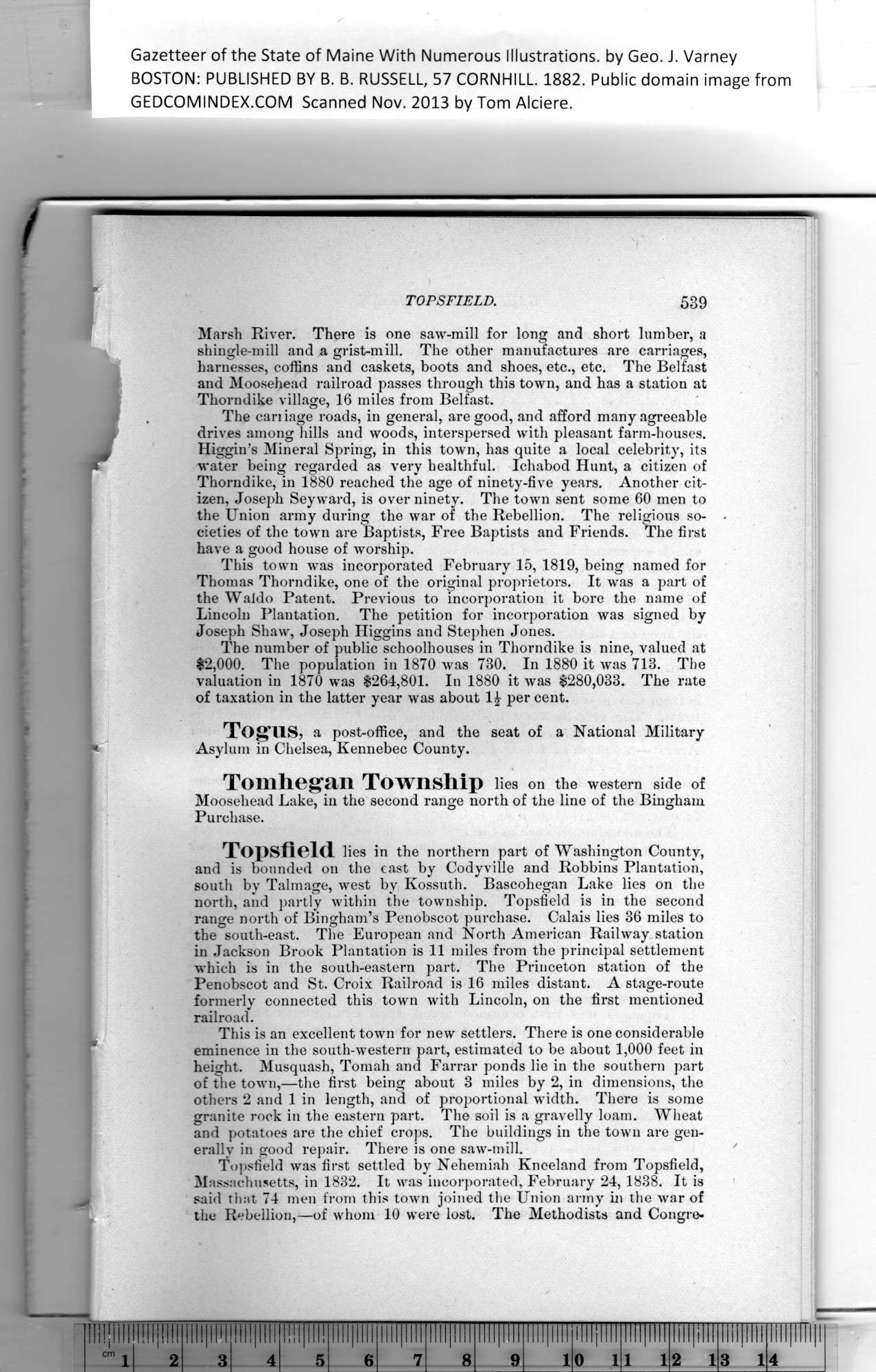|
Gazetteer of the State of Maine With Numerous Illustrations, by Geo. J. Varney
BOSTON: PUBLISHED BY B. B. RUSSELL, 57 CORNHILL. 1882. Public domain image from
TOPSFIELD.
Marsh River. There is one saw-mill for long and short lumber, a
shingle-mill and a grist-mill. The other manufactures are carriages,
harnesses, coffins and caskets, boots and shoes, etc., etc. The Belfast
and Moosehead railroad passes through this town, and has a station at
Thorndike village, 16 miles from Belfast.
The carriage roads, in general, are good, and afford many agreeable
drives among hills and woods, interspersed with pleasant farm-houses.
Higgin’s Mineral Spring, in this town, has quite a local celebrity, its
water being regarded as very healthful. Ichabod Hunt, a citizen of
Thorndike, in 1880 reached the age of ninety-five years. Another cit-
izen, Joseph Seyward, is over ninety. The town sent some 60 men to
the Union army during the war of the Rebellion. The religious so-
cieties of the town are Baptists, Free Baptists and Friends. The first
have a good house of worship.
This town was incorporated February 15, 1819, being named for
Thomas Thorndike, one of the original proprietors. It was a part of
the Waldo Patent. Previous to incorporation it bore the name of
Lincoln Plantation. The petition for incorporation was signed by
Joseph Shaw, Joseph Higgins and Stephen Jones.
The number of public schoolhouses in Thorndike is nine, valued at
$2,000. The population in 1870 was 730. In 1880 it was 713. The
valuation in 1870 was $264,801. In 1880 it was $280,033. The rate
of taxation in the latter year was about 1£ per cent.
Togus, a post-office, and the
Asylum in Chelsea, Kennebec County.
seat of a National Military
Tomhegan Township lies on the western side of
Moosehead Lake, in the second range north of the line of the Bingham
Purchase.
Topsfleld lies in the northern part of Washington County,
and is bounded on the east by Codyville and Robbins Plantation,
south by Talmage, west by Kossuth. Bascohegan Lake lies on the
north, and partly within the township. Topsfield is in the second
range north of Bingham’s Penobscot purchase. Calais lies 36 miles to
the south-east. The European and North American Railway station
in Jackson Brook Plantation is 11 miles from the principal settlement
which is in the south-eastern part. The Princeton station of the
Penobscot and St. Croix Railroad is 16 miles distant. A stage-route
formerly connected this town with Lincoln, on the first mentioned
railroad.
This is an excellent town for new settlers. There is one considerable
eminence in the south-western part, estimated to be about 1,000 feet in
height. Musquash, Tomah and Farrar ponds lie in the southern part
of the town,—the first being about 3 miles by 2, in dimensions, the
others 2 and 1 in length, and of proportional width. There is some
granite rock in the eastern part. The soil is a gravelly loam. Wheat
and potatoes are the chief crops. The buildings in the town are gen-
erally in good repair. There is one saw-mill.
Topsfield was first settled by Nehemiah Kneeland from Topsfield,
Massachusetts, in 1832. It was incorporated, February 24, 1838. It is
said that 74 men from this town joined the Union army in the war of
the Rebellion,—of whom 10 were lost. The Methodists and Congre-
PREVIOUS PAGE ... NEXT PAGE
This page was written in HTML using a program written in Python 3.2
|
